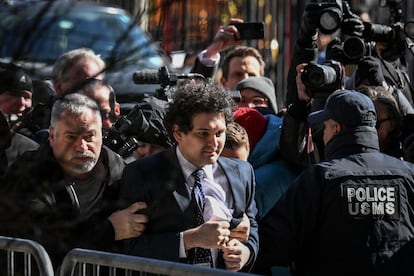FTX executives ‘joked about their tendency to lose track of millions of dollars’
Administrators’ report says cryptocurrency firm’s downfall was due to ‘hubris, incompetence and greed’


At the FTX cryptocurrency exchange, executives mixed up company and client funds and joked internally about their tendency to lose track of millions of dollars in assets. That’s according to the first report issued by the now-defunct company’s debtors. “While the failure of FTX Group is novel in the unprecedented scale of damage it has caused in a burgeoning industry, many of its causes are well known: hubris, incompetence and greed” said the report, which was filed with the U.S. Bankruptcy Court for the District of Delaware on Sunday.
The interim 39-page report is signed by John Ray III, who has been commissioned to liquidate FTX. It is the first report to be released since the crypto company led by Sam Bankman-Fried filed for bankruptcy last November. The liquidators are tasked with tracking down the lost cryptocurrency investments of more than a million people, and according to their first report, they are not pleased by what they have found.
John Ray III had already made it clear that his first impression of the company could not have been any worse. “Never in my career have I seen such a complete failure of corporate controls and such a complete absence of trustworthy financial information as occurred here,” Ray — who previously liquidated bankrupt companies such as Enron and Northel — said in court documents in November.
After spending months investigating what happened, recovering company assets and organizing what remains of it, his impression has not improved. “Despite the public image it sought to create of a responsible business, the FTX Group was tightly controlled by a small group of individuals who showed little interest in instituting an appropriate oversight or control framework,” the report said.
“These individuals suppressed dissent, misappropriated corporate and client funds, lied to third parties about their business, internally joked about their tendency to lose track of millions of dollars in assets, and thus caused the FTX group to fall sharply,” the report added.
According to John Ray III, FTX’s serious lack of controls jeopardized its crypto assets and funds from the start. This has also made the work of recovering assets more difficult, although the report said “significant progress” had been made.
So far, debtors have recovered and secured more than $1.4 billion in digital assets and identified another $1.7 billion, also in digital assets, which they are in the process of recovering. According to the report, in its effort to recover these assets, the liquidators worked with experts in computer engineering, cryptography, blockchain technology, cybersecurity, computer architecture and cloud computing. The document also claims that a malicious party tried to seize $432 million and that some former FTX executives, including Bankman-Fried, used passwords from digital wallets to transfer funds to accounts in the Bahamas.
FTX’s lack of controls created an environment in which a handful of employees had virtually unlimited power to direct transfers of fiat and crypto assets and to hire and fire employees, with no effective oversight or controls over how they exercised those powers, states the report. The document adds that it has not been possible to find a complete organizational chart of the group’s entities and that at the time it filed for bankruptcy, FTX didn’t even have a full list of its employees.
The problem reached dizzying proportions. At its peak, FTX operated in 250 jurisdictions, controlled tens of billions of dollars in assets across various businesses, carried out up to 26 million transactions a day and had millions of users. Despite this, the group lacked financial and accounting controls. The auditors are now trying to rebuild the balance sheets.
Bankman-Fried was arrested in the Bahamas, extradited to the United States and is under house arrest. He pled not guilty to eight counts, including wire fraud, conspiracy to commit securities fraud and conspiracy to commit money laundering. In a newly rewritten indictment, he was also charged with paying a $40 million bribe to Chinese officials. He is set to stand trial in October. Carolyn Ellison, who ran Alameda Research, a fund that ran parallel to FTX, and Gary Wang, FTX’s co-founder, have already pleaded guilty to various charges, as has Nishad Singh, FTX’s former director of engineering. All three are cooperating with the justice system.
Sign up for our weekly newsletter to get more English-language news coverage from EL PAÍS USA Edition
Tu suscripción se está usando en otro dispositivo
¿Quieres añadir otro usuario a tu suscripción?
Si continúas leyendo en este dispositivo, no se podrá leer en el otro.
FlechaTu suscripción se está usando en otro dispositivo y solo puedes acceder a EL PAÍS desde un dispositivo a la vez.
Si quieres compartir tu cuenta, cambia tu suscripción a la modalidad Premium, así podrás añadir otro usuario. Cada uno accederá con su propia cuenta de email, lo que os permitirá personalizar vuestra experiencia en EL PAÍS.
¿Tienes una suscripción de empresa? Accede aquí para contratar más cuentas.
En el caso de no saber quién está usando tu cuenta, te recomendamos cambiar tu contraseña aquí.
Si decides continuar compartiendo tu cuenta, este mensaje se mostrará en tu dispositivo y en el de la otra persona que está usando tu cuenta de forma indefinida, afectando a tu experiencia de lectura. Puedes consultar aquí los términos y condiciones de la suscripción digital.








































